Lexapro (escitalopram) is the most commonly prescribed medication to treat anxiety and depression majorly in the country like USA, and Canada. If you are also taking this medication, you might be wondering, "When is the best time to take Lexapro for anxiety for maximum relief"?
This is a common question, and knowing the timing can make a huge difference in deciding how you feel the entire day. Whether you are struggling with morning anxiety or want a quality sleep at night, understanding the timing can help get the most out of the medicine. Let's explore the blog and learn about the right timing along with other beneficial tips.
Best Time to Take Lexapro for Anxiety
Lexapro is prescribed once a day. However, the right time is still unknown. You can consider these factors when deciding the timing to take the medicine:
Individual Preference: You might have personal routines that impact your medicine schedule. Hence, it's crucial to select a time that basically aligns with your everyday routine and even helps you remember to consistently take the medicine.
Symptom Pattern: If you notice more symptoms of anxiety in the morning or evening, adjusting the time might help target those symptoms based on the specific timing.
Side Effects: Understanding Lexapro's possible side effects can also help decide the timing of the medicine. If it causes insomnia (difficulty sleeping), take it in the morning, and if it causes drowsiness, the evening might be a suitable time.
Note: Pick the timing that is easy to remember. Taking the medicine at the same time of day helps maintain the level of the drug in the system.
Doctors usually say there is no single best time to take Lexapro for anxiety because the improvement does not depend much on morning or night. What matters more is regular timing because escitalopram has a long half‑life of about 27–33 hours. It builds steady levels in 1–2 weeks, so the focus stays on consistency.
Morning vs. Evening: Which Time is the Best?
Both morning and evening administration have benefits depending on the circumstances of a person:
Benefits of a Morning Dose:
More Energy Levels: Increased energy and a focused mind for the entire day, which is particularly beneficial if you experience anxiety symptoms like difficulty concentrating or fatigue.
Improved Mood: Stabilizing emotions helps deal with the challenges and improve the mood for the day.
Better Sleep Quality: As the effect of the medication starts decreasing by bedtime, you can take it in the morning if you have insomnia, allowing sound sleep at night.
Consistency with everyday Routine: Morning administration is easy to add to your daily routine. This makes it much easier to remember and consistently take the medicine.
Benefits of Evening Dose:
Improved Sleep: Take Lexapro in the evening, if drowsiness is the side effect you experience, making you fall asleep and enjoy quality sleep.
Minimized Daytime Drowsiness: If you feel tired in the morning after taking it, you are alert and refreshed the entire day.
Consistent Drug Levels: As Lexapro has a half‑life of 27–33 hours, evening dosing ensures that its levels remain steady throughout the day, offering consistent relief from symptoms.
How Lexapro Works Inside Your Body (Why Timing Is Flexible)
Lexapro absorbs well in the stomach. Food does not affect how much of the drug your body absorbs. Peak levels occur approximately five hours after administration. The medicine is distributed widely throughout the body, with a volume of distribution of roughly 12 L/kg. It binds to proteins at approximately 56%.
The body breaks it down mainly through CYP3A4 and CYP2C19. Because the half‑life stays between twenty‑seven and thirty‑three hours, the effect lasts for more than twenty‑four hours. This long action is the main reason you can take it either in the morning or evening without losing benefits.
Can You Take Lexapro With Food or Without Food?
You can take Lexapro (escitalopram) with food as well as without food. However, having it with food might help reduce stomach discomfort if you have any. One clinical study shows that taking Lexapro on an empty stomach can cause nausea in up to 18%, during the initial few weeks. So, if you also feel nauseated after taking the medication, a better option is to have it with food.
How Long to Take Lexapro for Anxiety?
Here's how long you should take Lexapro to manage the symptoms of anxiety:
If you are dealing with the initial episode of anxiety or depression, take it for a defined time. Many people begin to feel early changes in 1–4 weeks, and full relief often takes 4–8 weeks. Doctors usually suggest continuing treatment for some months after improvement. Duration becomes longer only if symptoms return often.
If you have recurring episodes or chronic anxiety, the doctor may prescribe it for a long period, for several years.
Hence, it is crucial to always follow the recommended dose by the doctor. In addition, never stop it suddenly without their guidance, as it can cause withdrawal symptoms and increase the chances of recurring anxiety symptoms. Regular follow-up is important to determine the right duration.
Potential Lexapro Side Effects
Be aware of these possible side effects as they will help adjust the timing of the medicine.
Nausea – 18%
Drowsiness – 13%
Insomnia – 12%
Fatigue – 8%
In case of severe side effects, immediately visit the nearest emergency department or call 911.
In case of overdosing (symptoms include increased sweating, gastrointestinal irritation, nausea, large bowel sounds, blurred vision, or dilated pupils), call 1-800-222-1222, poison control center.
Withdrawal symptoms
Never stop the use of Lexapro suddenly without consulting the doctor as it can lead to withdrawal symptoms which appear for a few days and slowly subside in one or two weeks. Those symptoms include:
Flu-like symptoms, including diarrhea, muscle aches, or tiredness
Nausea or vomiting
Feeling on edge or anxiety
Headache
Dizziness
Difficulty sleeping
Electric shock sensations
What If You Miss Lexapro Dose?
In case you miss or forget to take the medicine, follow these guidelines:
Do not take the dose twice to compensate for the missed one.
If you missed the dose of the day before bedtime, take it straight away. Continue with the regular dosing schedule the next day.
If you remember about the dose late at night or the right next day, don't take the missed dose and take the dose of that day only.
If you often miss doses, set an alarm for a reminder. Also, you can discuss with your pharmacist for tips on helping you remember the time to take the medication.
Final Thoughts
The best time to take Lexapro for anxiety depends on how this medication makes you feel throughout the day and your everyday routine. For some individuals, it works ideally in the morning, while for others in the evening. The key is to keep a watch over the response of the medicine and identify the timing that perfectly works for you. If you experience any side effects, speak regularly with your doctor that help adjust your treatment plan.
There is no standard answer, but with consistent timing and appropriate adjustments, Lexapro can efficiently address anxiety symptoms.
Read Also: Find Effective Alternatives to Lexapro for Treating Anxiety
अक्सर पूछे जाने वाले प्रश्नों
Is Lexapro energizing or sedating?
Lexapro is neutral, causing no stimulation and sedation. However, some individuals might experience side effects in the initial days of the treatment.
Can Lexapro cause weight gain?
Yes, Lexapro may lead to a small increase in weight. If you notice dramatic or rapid weight gain, see a doctor.
Does Lexapro make you tired and lazy?
Yes, tiredness is the side effect of Lexapro that you experience in the initial few days of the treatment.
How long does Lexapro take to show its effects?
It takes one or two weeks to resolve symptoms like less energy, difficulty sleeping, or low appetite. However, it may take around 6-8 weeks to manage symptoms like depressive feelings.
Is Zoloft more powerful than Lexapro?
No, Zoloft is not much more effective than Lexapro as Lexapro works differently than Zoloft and helps maintain the serotonin levels in the brain.
Should I take Lexapro at night or in the morning?
Take it at the time that matches your side effects. Morning helps if you have insomnia. Night helps if you feel sleepy after the dose. The important thing is to keep the timing the same every day because steady levels improve anxiety relief.
लेखक





